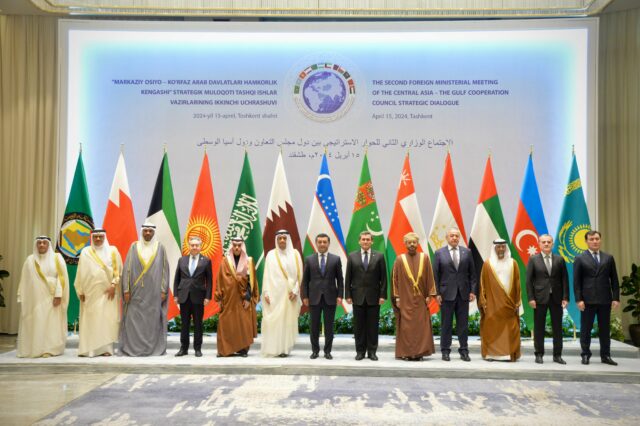High-Level Meeting Between Central Asian and Gulf Cooperation Council (GCC) Countries

Geopolitical Report ISSN 2785-2598 Volume 41 Issue 14
SpecialEurasia OSINT Unit
Executive Summary
The high-level meeting in Tashkent between Central Asian and Gulf Cooperation Council (GCC) countries presented an opportunity to strengthen regional cooperation amidst developing geopolitical challenges.
With delegations from Kazakhstan, Kyrgyzstan, Tajikistan, Turkmenistan, and Uzbekistan, alongside representatives from Bahrain, Qatar, Kuwait, the UAE, Oman, and Saudi Arabia, discussions will focus on advancing agreements made during the inaugural summit in Jeddah.
However, the escalating Palestinian-Israeli conflict and its potential impact on regional logistics necessitate a reassessment of priorities from both the parties.
Central Asia – GCC Countries’ Meeting: Background Information
On April 15th, 2024, a high-level meeting occurred in Tashkent, Uzbekistan, involving the Foreign Ministers of Central Asian nations and Arab states from the Persian Gulf. This event marks the second meeting of its kind and follows the inaugural summit held on July 19th, 2023, in Jeddah.
The participating delegations include representatives from Kazakhstan, Kyrgyzstan, Tajikistan, Turkmenistan, and Uzbekistan, as well as Bahrain, Qatar, Kuwait, the UAE, Oman, and Saudi Arabia.
The agenda for the meeting encompasses discussions on the progress of agreements reached during the previous summit, with a focus on strengthening cooperation in political, economic, investment, transportation, and communication sectors.
Additionally, the participants addressed topics such as cultural exchange, humanitarian cooperation, security, and environmental protection. Of particular importance is the preparation for the upcoming summit in 2025, planned to be held in Samarkand, Uzbekistan.
However, the developments in the Palestinian-Israeli conflict caused a re-evaluation of priorities from Central Asian republics and Gulf Arab monarchies, especially considering the military escalation that interested Tehran and Tel Aviv.
Foreign Ministers Jeenbek Kulubaev of Kyrgyzstan and Bakhtiyor Saidov of Uzbekistan have already outlined key themes of mutual trust and collaboration, recognising Central Asia as a region of stability and security amidst geopolitical challenges.
Given that most Central Asian countries are members of organisations like the Collective Security Treaty Organisation (CSTO), Shanghai Cooperation Organisation (SCO), and the Commonwealth of Independent States (CIS), their participation underscores the significance of regional cooperation.
Israel-Palestine Conflict, GCC Countries, and Central Asia: A Risk Assessment
The impact of the Palestinian-Israeli conflict on Central Asian countries is significant and should not be underestimated. It prompts a reassessment of transportation logistics, particularly regarding the viability of ongoing and proposed projects involving the United States, European Union, China, and Russia.
Experts warn that further escalation between Iran and Israel could disrupt logistical routes, including the Kazakhstan-Turkmenistan-Iran railway and initiatives for high-speed freight trains.
Considering these developments, there is a growing imperative to advance the Trans-Afghan transport corridor. However, Central Asian states may face challenges as Afghanistan proceeds with the completion of the Kosh Tepa irrigation canal, diverting water from the Amu Darya River. Such actions could lead to ecological catastrophe, affecting Uzbekistan, Turkmenistan, and other countries within the Amu Darya basin.
The timing and logistics of future summits, such as the planned 2025 meeting in Samarkand, remain uncertain because of the rapidly evolving geopolitical landscape. It is imperative for participating nations to remain vigilant and adaptable to emerging threats and opportunities, ensuring regional stability and cooperation amid geopolitical uncertainties.
Conclusion/Recommendation
The recent high-level meeting between Central Asian and GCC countries signifies a promising opportunity for strategic collaboration amid prevailing geopolitical uncertainties. Participating nations stand to benefit from prioritising dialogue and joint efforts to address emerging challenges, especially concerning regional logistics and environmental issues.
These countries can promote stability and economic growth in the region by actively managing risks and adapting to changing geopolitical conditions.
The summit reaffirms the GCC members’ keen interest in Central Asia and their strategic endeavour to augment their regional influence as pivotal stakeholders.
Notably, Gulf Arab monarchies have showed their commitment by channelling substantial financial investments into infrastructural development projects within the region, alongside providing vital humanitarian aid and fostering religious and cultural cooperation.
The diplomatic engagement observed at the Foreign Ministries summit underscores the maturation of GCC states as significant geopolitical actors in Central Asia, capable of both complementing and countering the influence of other regional powers such as Russia, China, the United States, and Turkey.
Read also | Geopolitics in Action: How the “Central Asia + GCC” Summit Is Redefining Regional Dynamics |
If you need further information, reports, and analyses about Central Asia and the region’s relations with the Gulf Arab monarchies, contact us at info@specialeurasia.com.
